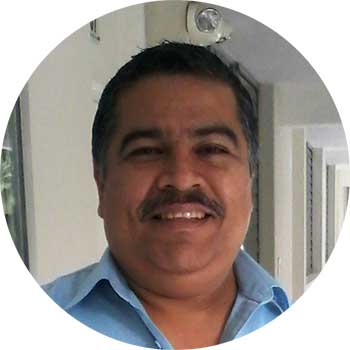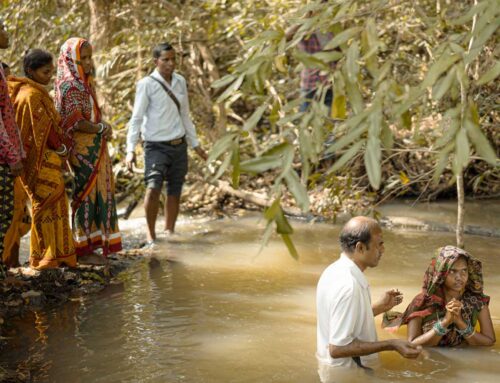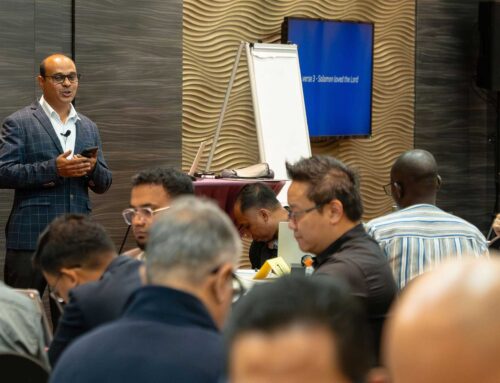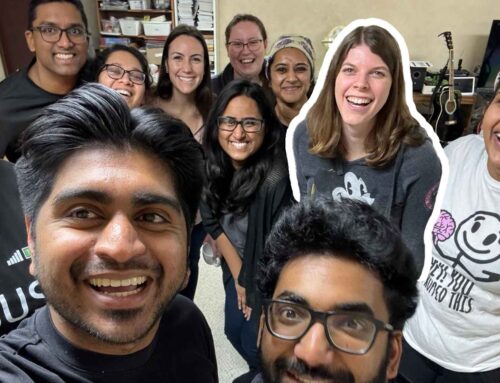Fighting Corruption with the Gospel in Guatemala
 Elder Lemus gave his life to Christ as a seven-year-old boy in Guatemala. The son of a pastor, Elder continued the family tradition by pursuing a seminary degree and eventually teaching in a Christian school. In 2006, a ministry colleague recommended he attend the Haggai Leader Experience (HLE). Elder pursued the opportunity to expand his ministry capabilities, but God would use the experience to inspire a brand-new calling.
Elder Lemus gave his life to Christ as a seven-year-old boy in Guatemala. The son of a pastor, Elder continued the family tradition by pursuing a seminary degree and eventually teaching in a Christian school. In 2006, a ministry colleague recommended he attend the Haggai Leader Experience (HLE). Elder pursued the opportunity to expand his ministry capabilities, but God would use the experience to inspire a brand-new calling.
“The HLE was the best work out of my life. It was the greatest blessing I received from my Heavenly Father. In 2006 I was still [teaching] in the Christian school, but in 2008 I began political work in my city. It made me feel the need to share my testimony with the people around me, even with the authorities themselves.”
Many Haggai leaders serve in closed nations, or in regions where Gospel poverty exists because the religious landscape is not predominantly Christian. Guatemala is different. The country has a strong culturally Christian influence, but widespread political corruption, as well as a culture of violence, plague the small Central American nation.
This is why, when tasked with addressing Gospel poverty in his home country, Elder pursued a career in politics. As the deputy mayor in the city of Amatitlan, Elder’s role is as the first advisor to the mayor. He advises the mayor in policy decisions and leads development projects to improve schools, infrastructure, utilities, and community safety. It is within the context of government that Elder believes his witness has the potential to change his country.
“To combat corruption, a new leadership must emerge, people who put values and ethics first. Some laws and regulations must be reformed, especially in the control of customs… The question we ask ourselves now is, where is the influence of the church?”
A recent scandal involving federal judges colluding on behalf of corrupt Tax Administration employees exposed corruption and fraud at multiple levels in Guatemalan government. Elder believes his work in city government, along with teaching a new generation of students at a seminary, is the most effective way to help bring about a more stable, ethical culture in Guatemala’s political systems.
“Corruption has been in all the structures of the State. And again, I say this, the Christian church has fallen asleep. We have to take the message of Jesus against the thieves who have taken the very temple of God and turned it into a den of thieves. Jesus Christ, who faced the same system at the cost of his own life, pointed out the injustices committed against the poorest and most dispossessed of the nation. That has to be our attitude now with the new generations.”
Though Elder plans to retire from politics this year, he is still committed to equipping young leaders to advance the Gospel and fight corruption. He serves on the board of Haggai’s alumni association and is currently establishing a new ministry to educate and mentor young leaders in Guatemala, equipping them “to be better Christians and citizens and together change the course of our nation.”
Fighting Corruption with the Gospel in Guatemala
 Elder Lemus gave his life to Christ as a seven-year-old boy in Guatemala. The son of a pastor, Elder continued the family tradition by pursuing a seminary degree and eventually teaching in a Christian school. In 2006, a ministry colleague recommended he attend the Haggai Leader Experience (HLE). Elder pursued the opportunity to expand his ministry capabilities, but God would use the experience to inspire a brand-new calling.
Elder Lemus gave his life to Christ as a seven-year-old boy in Guatemala. The son of a pastor, Elder continued the family tradition by pursuing a seminary degree and eventually teaching in a Christian school. In 2006, a ministry colleague recommended he attend the Haggai Leader Experience (HLE). Elder pursued the opportunity to expand his ministry capabilities, but God would use the experience to inspire a brand-new calling.
“The HLE was the best work out of my life. It was the greatest blessing I received from my Heavenly Father. In 2006 I was still [teaching] in the Christian school, but in 2008 I began political work in my city. It made me feel the need to share my testimony with the people around me, even with the authorities themselves.”
Many Haggai leaders serve in closed nations, or in regions where Gospel poverty exists because the religious landscape is not predominantly Christian. Guatemala is different. The country has a strong culturally Christian influence, but widespread political corruption, as well as a culture of violence, plague the small Central American nation.
This is why, when tasked with addressing Gospel poverty in his home country, Elder pursued a career in politics. As the deputy mayor in the city of Amatitlan, Elder’s role is as the first advisor to the mayor. He advises the mayor in policy decisions and leads development projects to improve schools, infrastructure, utilities, and community safety. It is within the context of government that Elder believes his witness has the potential to change his country.
“To combat corruption, a new leadership must emerge, people who put values and ethics first. Some laws and regulations must be reformed, especially in the control of customs… The question we ask ourselves now is, where is the influence of the church?”
A recent scandal involving federal judges colluding on behalf of corrupt Tax Administration employees exposed corruption and fraud at multiple levels in Guatemalan government. Elder believes his work in city government, along with teaching a new generation of students at a seminary, is the most effective way to help bring about a more stable, ethical culture in Guatemala’s political systems.
“Corruption has been in all the structures of the State. And again, I say this, the Christian church has fallen asleep. We have to take the message of Jesus against the thieves who have taken the very temple of God and turned it into a den of thieves. Jesus Christ, who faced the same system at the cost of his own life, pointed out the injustices committed against the poorest and most dispossessed of the nation. That has to be our attitude now with the new generations.”
Though Elder plans to retire from politics this year, he is still committed to equipping young leaders to advance the Gospel and fight corruption. He serves on the board of Haggai’s alumni association and is currently establishing a new ministry to educate and mentor young leaders in Guatemala, equipping them “to be better Christians and citizens and together change the course of our nation.”
Fighting Corruption with the Gospel in Guatemala
 Elder Lemus gave his life to Christ as a seven-year-old boy in Guatemala. The son of a pastor, Elder continued the family tradition by pursuing a seminary degree and eventually teaching in a Christian school. In 2006, a ministry colleague recommended he attend the Haggai Leader Experience (HLE). Elder pursued the opportunity to expand his ministry capabilities, but God would use the experience to inspire a brand-new calling.
Elder Lemus gave his life to Christ as a seven-year-old boy in Guatemala. The son of a pastor, Elder continued the family tradition by pursuing a seminary degree and eventually teaching in a Christian school. In 2006, a ministry colleague recommended he attend the Haggai Leader Experience (HLE). Elder pursued the opportunity to expand his ministry capabilities, but God would use the experience to inspire a brand-new calling.
“The HLE was the best work out of my life. It was the greatest blessing I received from my Heavenly Father. In 2006 I was still [teaching] in the Christian school, but in 2008 I began political work in my city. It made me feel the need to share my testimony with the people around me, even with the authorities themselves.”
Many Haggai leaders serve in closed nations, or in regions where Gospel poverty exists because the religious landscape is not predominantly Christian. Guatemala is different. The country has a strong culturally Christian influence, but widespread political corruption, as well as a culture of violence, plague the small Central American nation.
This is why, when tasked with addressing Gospel poverty in his home country, Elder pursued a career in politics. As the deputy mayor in the city of Amatitlan, Elder’s role is as the first advisor to the mayor. He advises the mayor in policy decisions and leads development projects to improve schools, infrastructure, utilities, and community safety. It is within the context of government that Elder believes his witness has the potential to change his country.
“To combat corruption, a new leadership must emerge, people who put values and ethics first. Some laws and regulations must be reformed, especially in the control of customs… The question we ask ourselves now is, where is the influence of the church?”
A recent scandal involving federal judges colluding on behalf of corrupt Tax Administration employees exposed corruption and fraud at multiple levels in Guatemalan government. Elder believes his work in city government, along with teaching a new generation of students at a seminary, is the most effective way to help bring about a more stable, ethical culture in Guatemala’s political systems.
“Corruption has been in all the structures of the State. And again, I say this, the Christian church has fallen asleep. We have to take the message of Jesus against the thieves who have taken the very temple of God and turned it into a den of thieves. Jesus Christ, who faced the same system at the cost of his own life, pointed out the injustices committed against the poorest and most dispossessed of the nation. That has to be our attitude now with the new generations.”
Though Elder plans to retire from politics this year, he is still committed to equipping young leaders to advance the Gospel and fight corruption. He serves on the board of Haggai’s alumni association and is currently establishing a new ministry to educate and mentor young leaders in Guatemala, equipping them “to be better Christians and citizens and together change the course of our nation.”















